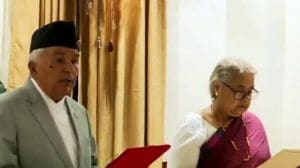West asia talks wind up in zilch
JERUSALEM, JAN 28: Israel and the Palestinians have ended five days of talks in Egypt without a peace deal, all but killing off hopes of a...

JERUSALEM, JAN 28: Israel and the Palestinians have ended five days of talks in Egypt without a peace deal, all but killing off hopes of a breakthrough before an election which is expected to oust Israeli Prime Minister Ehud Barak.
Negotiators issued a joint statement late on Saturday saying they were closer than ever to an agreement after the talks in the Egyptian Red Sea resort of Taba. They also said they hoped the remaining gaps would be bridged after the election on February 6, even though opinion polls show Barak losing to right-wing challenger Ariel Sharon by 16 to 18 percentage points.
“It is doubtful there has ever been a round of talks so serious, deep and detailed,” Foreign Minister Shlomo Ben-Ami, Israel’s chief negotiator, said in Taba on Saturday.
Palestinian negotiator Ahmed Korei, also known as Abu Ala, was cautious, however, saying: “No doubt gaps on all issues remain. I cannot say these gaps are easy to bridge because the issues are not easy.” Both sides said Palestinian President Yasser Arafat might also meet Barak in Sweden on Tuesday or Wednesday in a bid to further boost peace hopes. A leading pollster, Yaacov Levy of Gallup Israel, told Israel’s Army Radio there was no indication that peace efforts were paying off. “There is no serious momentum of closing the gap,” Levy said.
Speaking at a campaign event in working-class Bat Yam near Tel Aviv on Saturday night, Sharon, 72, accused Barak, 58, of failing to boost his election hopes despite a joint statement with the Palestinians. “When it will be verified to the citizens of Israel what is in this paper, what Barak conceded and what he is prepared to concede, it won’t add votes,” said Sharon, architect of Israel’s 1982 Lebanon invasion and champion of illegal Jewish settlement.
In the meanwhile, bloodshed continued in the West Bank and Gaza Strip since the talks began, and at one point prompted the Israelis to suspend them for two days. At least 373 people have been killed in the past four months, 312 of them Palestinians, 48 Israelis and 13 Israeli Arabs. Several Palestinians were hurt in Saturday’s clashes near Ramallah and Nablus in the West Bank, Palestinian sources said.
The negotiators discussed four main issues in Taba–the fate of Palestinian refugees, borders, security and the future of Jerusalem.
A Palestinian official said the sides had agreed not to publicise the points of agreement hammered out by the negotiating teams so that they might resume their work without intervention after the election. The Palestinians want to create a state in the West Bank and Gaza Strip, which Israel captured in the 1967 Middle East war.
Palestinian negotiators told Reuters that progress had been made on territorial issues, refugees, and security. One negotiator said the sides had agreed Israel would remain in control of four percent of the West Bank in the areas of the Jewish settlements of Ariel, Gush Etzion and near Jerusalem. He said the figure did not include a possible land swap that would give Israel more West Bank land in exchange for an equal amount of territory inside its own borders.
Negotiators were discussing dismantling slightly more than 100 Jewish settlements in the West Bank and Gaza and leaving some 25 in place, the delegate said. He added that some settlements around Jerusalem would be dismantled and that all settlements would be cleared away from the Gaza Strip and the Jordan Valley.
Sharon, the Likud party chief, takes a tougher line against the Palestinians than Barak does, opposing territorial compromises favoured by the Labour prime minister. Likud lawmaker Limor Livnat suggested the Taba talks would complicate life for a Sharon-led government, having failed to garner the support of the 120-seat Knesset, Israel’s parliament. "We are certainly not duty-bound to anything that failed to receive the approal of the Knesset, any sort of agreements, understandings that didn’t receive the approval of the Knesset, but they’ve created a sort of very complicated international situation for the next government," she said.
Israeli Arabs, 12 percent of Israel’s electorate, said that for lack of an accord in Taba, they still planned to withhold the support they gave Barak when he won election last time. The Arab minority in Israel assails Barak over the police killing of 13 Israeli Arabs at the start of the Palestinian uprising in October and accuse him of neglecting their needs. “To my great regret no agreement was reached for the establishment of a Palestinian state that would change this decision,” said Israeli Arab lawmaker Ahmed Tibi.
Photos





- 01
- 02
- 03
- 04
- 05


























